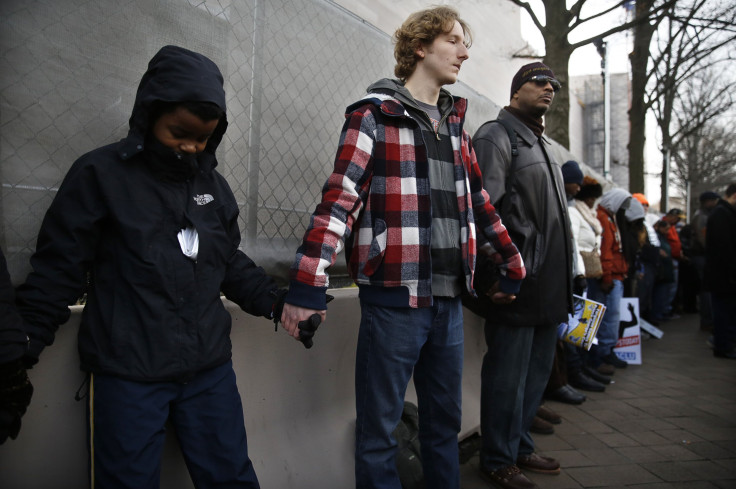Race Relations In America Today At Their Worst In 10 Years After Ferguson, Eric Garner Case: Poll

Americans’ views on race relations are more pessimistic than they've been in nearly 10 years following the recent decisions by grand juries not to indict white police officers in the deaths of unarmed black men in Missouri and New York, according to an NBC News/Wall Street Journal survey released Wednesday. Only 40 percent of Americans said race relations are good in the country, the lowest percentage since 34 percent felt that way in October 1995, when a jury acquitted black Hall of Fame football player O.J. Simpson in the deaths of his white ex-wife and her white friend.
Blacks had the gloomiest view on race relations, according to the poll. Only 35 percent of blacks polled said race relations in America were good, compared to 54 percent who said they were bad. Only 7 percent described race relations as being “very good.”
Hispanics were the most optimistic, with 51 percent characterizing race relations in the U.S. as good and 43 percent as bad. A majority of whites -- 58 percent -- said race relations were bad and 40 percent said they were good, including 4 percent who said they were “very good,” the smallest percentage of the three races polled.
The last time the poll surveyed Americans on race relations, a majority -- 52 percent – characterized them as good and 44 percent as bad. That was in July 2013, when President Barack Obama was six months into his second term as president.
The latest poll of 1,000 adults was conducted between Dec. 10 and Dec. 14, after the grand jury decisions in Ferguson, Missouri, and Staten Island, New York, resulted in no indictments against two white police officers in the deaths of Michael Brown and Eric Garner. The decisions led to protests across the country, including the looting of businesses in Ferguson, a suburb of St. Louis.
The poll’s release also came after a critical Senate report on CIA “enhanced interrogation techniques” shortly after the Sept. 11, 2001, attacks. The report from the Senate Intelligence Committee described the harsh methods, such as waterboarding, rectal feeding and rectal rehydration, as “torture” and said the tactics were brutal and ineffective.
But most Americans don’t feel that way, according to the poll. More than half of Americans -- 51 percent – said the methods were acceptable under the circumstances, while only 28 percent said they were wrong and went too far.
Americans' views are more mixed when it comes to whether the techniques should be used in the future. Obama banned the procedures when he took office. A plurality of Americans -- 45 percent – said the methods are acceptable and should be used in the future, 28 percent said the tactics are wrong and should stop entirely, and 23 percent said they don’t know enough about the issue to have an opinion.
The poll has a margin of error of 3.1 percent.
© Copyright IBTimes 2025. All rights reserved.






















